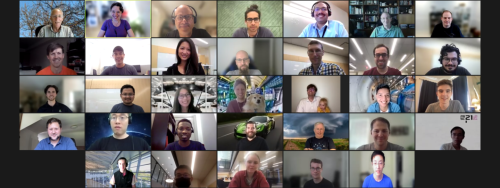
Eoin O'Carroll, Princeton Research Computing
September 6, 2022
At the fourth annual GPU Hackathon at Princeton held in June, experts from NVIDIA, Princeton, Oak Ridge National Laboratory, Boston College and the Institute of Electrical and Electronics Engineers worked with scientists to help them speed up their code.
One of the most powerful tools in scientific computing comes from one of the least expected places. Originally built to render graphics for video games, the graphics processing unit, or GPU, has emerged in recent years as a key hardware accelerator for a wide range of scientific research projects from modeling supernovae to finding patterns in texts used by social scientists to filtering the vast amounts of data collected by the Large Hadron Collider.
Since 2019, Princeton has helped promote the use of GPUs to accelerate academic research by hosting GPU Hackathons. Run in collaboration with the OpenACC organization, these multi-day events are open to all researchers and developers and help teams of scientists optimize their research code for GPUs by coupling them with experienced programming experts. At Princeton's fourth annual GPU Hackathon last month, eight teams of researchers including Arizona State University, Prairie View A&M University, University of Cincinnati, and Johns Hopkins University, spent four days working with pairs of mentors learning how to make their software run much more quickly.
Held remotely via Zoom, Slack, and email, Princeton's most recent GPU Hackathon was sponsored by OpenACC, NVIDIA, the Department of Energy's Oak Ridge Leadership Computing Facility, and PICSciE.
The participants hailed from a variety of disciplines, and their projects modeled phenomena ranging from the massive, like supernovae and black holes, to the miniscule, like subatomic particles interacting in a supercollider. One project developed a simulation for combustion. Another developed a face-recognition system. Another one developed an artificial neural network for reading enormous amounts of texts related to the social sciences.
Michael E. Mueller, Professor of Mechanical and Aerospace Engineering and Director of PICSciE’s Graduate Certificate in Computational Science and Engineering, led a team of researchers to substantially speed up a key kernel in their combustion codes that computes the chemical-reaction rates.
Mueller emphasized the Hackathon's ongoing impacts. “While we focused on one complicated and compute-intensive kernel during the Hackathon, the learning that my research team members gained will allow us to replicate this success in other parts of our codes," he says.
"In addition, the reduced barriers to GPU programming allowed participation across the spectrum of my research team, with the Hackathon group including a beginning graduate student, a senior graduate student, and postdocs. Each member was able to make meaningful contributions and learn something new."\
Princeton will hold its fifth annual GPU hackathon in June of 2023. For more information on Open Hackathons, visit www.openhackathons.org.